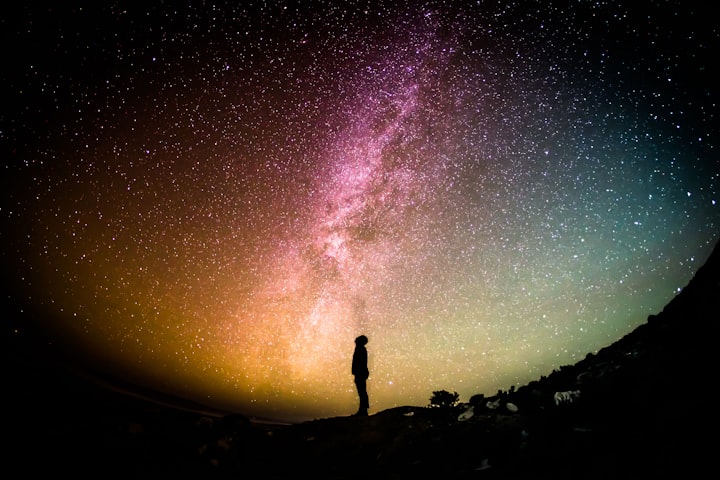
Consciousness is the state of being aware and understanding, as well as acknowledging our ignorance. Our daily consciousness is limited in its capacity to absorb information, and as a result, it often overlooks important details that could alleviate our concerns. If we were to possess a higher level of awareness and consciousness, we would experience a greater sense of peace and well-being. Our sensory organs are capable of perceiving only a fraction of the truth, and we must rely on instruments and other tools to expand our understanding and broaden our consciousness. The evolution of humanity and our dominance over other species can be attributed to our innate ability to network and collaborate with one another. Even if humanity were to be wiped out and restarted, communities would inevitably form, as the diversity of human brains ensures that structures within society will emerge. While other creatures also form societies, humans possess a unique ability to customize and mold themselves into the individuals they aspire to be.
It is impossible to definitively ascertain whether animals or any other form of life on Earth possess consciousness or operate in a manner similar to humans. While I am aware of my own thoughts, emotions, and feelings, it remains uncertain whether others possess the same. It is not feasible to peer into another's mind and gain a complete understanding of their thoughts. To truly comprehend the universe and experience life, one must relinquish their ego and embrace the present moment. It is futile to strive for perpetual happiness, as life is comprised of both positive and negative experiences. By accepting and embracing the full spectrum of life, one can attain a sense of fulfillment and satisfaction.
The concept of self implies the existence of other, just as the color white implies the existence of black, and death implies the existence of life. At the most fundamental level, one's existence is not an accident, but rather a fundamental aspect of being. The same essence that comprises an individual is also present in all other things. By stepping back from one's beliefs and sensory perceptions, one can begin to see the world for what it truly is. The question then arises: does one define oneself as a victim of the world, or as an integral part of it?
Love, in its truest form, is only possible when one relinquishes the notion of self. This requires the shedding of all walls and barriers that have been erected to keep others at bay. In doing so, one becomes an open book, ready to be filled with the newfound love that is discovered.
In sports such as basketball, soccer, or football, the objective is to pass the ball to others, rather than holding onto it oneself. Similarly, in life, one must recognize that defining oneself solely by one's ego or voluntary actions is limiting. There are also involuntary actions, such as the beating of one's heart, that are integral to one's existence.
Alan Watts once said that everyone is fundamentally an alternate reality, not in the traditional sense of God, but rather as the self - the most basic and fundamental aspect of being. However, one tends to forget this fact, as consciousness often overlooks critical information. To truly understand the universe and our place within it, we must first delve deep into ourselves.
The Big Bang serves as an example of this principle. To explore the farthest reaches of the universe, we must first explore the depths of our own being. The answers to life's most profound questions lie within us, waiting to be discovered.
Currently, there exist numerous theories regarding the origin of our existence. However, for the purpose of this discussion, let us consider the belief that one's human body is the sole representation of their being. In this view, an individual is merely a minuscule particle in an expansive universe of galaxies, stars, and planets, rendering them insignificant. Yet, upon rewinding time, the universe becomes more compact, and the atoms that constitute the human body become the fundamental building blocks of the universe. These atoms form the hot gas clouds that give rise to stars, which, in turn, allow for the formation of solar systems and planets such as Earth. Thus, when the universe was infinitesimally small, every individual was present at the moment of creation.
Despite this, we tend to define ourselves as separate entities, disconnected from the universe. We perceive ourselves as mere humans inhabiting a planet without any say in the matter. However, this is a flawed perspective. Every individual is a small component of the universe, a product of billions of years of engineering and architecture on a universal scale. We must recognize that we are not as distinct from the universe as we believe ourselves to be.
Rather than searching for the origin of the universe, we must acknowledge that we are the universe attempting to comprehend itself. To achieve this understanding, we must shift our mindset and recognize that our names, ideas, and personalities are all derived from the world around us. We are all different manifestations of consciousness, but fundamentally, we are the same. When we remove our egos and view the universe as a forest, we realize that every individual is a twig, leaf, or branch, and together, we form the essence of life. Our roots are interconnected, just as the roots of trees form a vast network that sustains the forest.
The origins of humanity can be traced back to a common source. It is a well-established scientific fact that energy cannot be created nor destroyed, but can only be transferred from one form to another. Despite this, many individuals harbor a fear that all will come to an end. While it is true that one's life will eventually come to a close, their energy will continue to exist indefinitely. Our consciousness has led us to believe otherwise, almost as if we have been hypnotized into thinking that we are the only beings that exist and that everything will eventually cease to exist. This mindset leaves us feeling unsatisfied and unhappy. However, the universe is continuous, and as individuals, we are technically a part of the universe. Therefore, we will continue to exist in some form or another. Death is not the end of an individual, but rather the end of their ego.
About the Creator
Eunoia
Hello, I'm Eunoi,
Thank you for stopping by. Feel free to ask questions in the comments of a story.






Comments
There are no comments for this story
Be the first to respond and start the conversation.